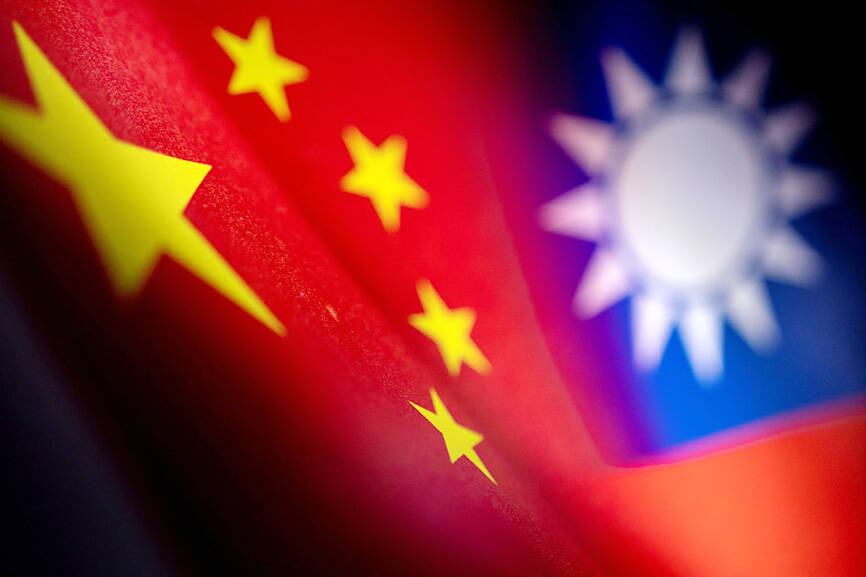China might implement pressure campaigns in the run-up to Taiwan’s presidential election next month, including introducing investment incentives and conducting military exercises around the country, to try and sway voters to cast their ballot in a more pro-Beijing direction, an expert said on Thursday.
In contrast to how official communications with Taiwan were severed after President Tsai Ing-wen (蔡英文) won her first-term victory in 2016, the Chinese Communist Party (CCP) has continued full steam ahead in its efforts to win the hearts of Taiwanese business people, said Kung Shan-son (龔祥生), a researcher at the Taiwan government-funded think tank Institute for National Defense and Security Research.
At a forum in Taipei, Kung highlighted that in September, as Taiwan’s election campaign intensified, China announced a total of 22 new policies aimed at facilitating the creation of a “demonstration zone” in coastal Fujian Province to facilitate cross-strait economic collaboration.

Photo: Reuters
On the military front, in the past China has hesitated to employ military pressure in the run-up to a major Taiwanese election, fearing that such aggressiveness could cause Taiwanese to vote for an anti-Beijing party, he said.
However, there might be less incentive for China to exercise restraint this year, as voters are more set on which way they will vote, which could leave less room for Beijing’s “carrot” approach to sway a meaningful amount of voters, he said.
He added the CCP might not be laser-focused on working toward one “particular political party” being elected, as has traditionally been the case, although he did not mention which party he was referring to.
The Chinese Nationalist Party ‘s (KMT) presidential nominee, New Taipei City Mayor Hou You-yi (侯友宜), who is more China-friendly, is trailing the Democratic Progressive Party’s (DPP) nominee, Vice President William Lai (賴清德) and Taiwan People’s Party Chairman and presidential candidate Ko Wen-je (柯文哲) in polls for months.
However, Hou has gained momentum among the KMT base since announcing media personality and opinion leader Jaw Shaw-kong (趙少康) as his running mate last week, and while still lagging behind Lai, he is now polling ahead of Ko in most polls released this week.
In addition to military exercises around Taiwan, the CCP could employ coercive economic and trade policies as tools of intimidation in the lead-up to the Jan. 13 elections, with the aim of influencing Taiwanese voters, Kung said.
These might include measures similar to the banning of Taiwanese mangoes in August, he added.
The Taiwanese government labeled the ban on the fruit as “meddling in the presidential election,” while China attributed the move to the discovery of agricultural pests in recent shipments.
The CCP may, at the right time, lift the ban in a bid to showcase “goodwill” toward Taiwan, the expert said.
However, the effectiveness of the “carrot and stick” strategy might not meet the CCP’s expectations, as Taiwanese voters are accustomed to such approaches before elections, Kung said.
Given the downturn in China’s economy, investment incentives might not yield anticipated results, he said.

Taiwan is stepping up plans to create self-sufficient supply chains for combat drones and increase foreign orders from the US to counter China’s numerical superiority, a defense official said on Saturday. Commenting on condition of anonymity, the official said the nation’s armed forces are in agreement with US Admiral Samuel Paparo’s assessment that Taiwan’s military must be prepared to turn the nation’s waters into a “hellscape” for the Chinese People’s Liberation Army (PLA). Paparo, the commander of the US Indo-Pacific Command, reiterated the concept during a Congressional hearing in Washington on Wednesday. He first coined the term in a security conference last

Prosecutors today declined to say who was questioned regarding alleged forgery on petitions to recall Democratic Progressive Party (DPP) legislators, after Chinese-language media earlier reported that members of the Chinese Nationalist Party (KMT) Youth League were brought in for questioning. The Ministry of Justice Investigation Bureau confirmed that two people had been questioned, but did not disclose any further information about the ongoing investigation. KMT Youth League members Lee Hsiao-liang (李孝亮) and Liu Szu-yin (劉思吟) — who are leading the effort to recall DPP caucus chief executive Rosalia Wu (吳思瑤) and Legislator Wu Pei-yi (吳沛憶) — both posted on Facebook saying: “I

The Ministry of Economic Affairs has fined Taobao NT$1.2 million (US$36,912) for advertisements that exceed its approved business scope, requiring the Chinese e-commerce platform to make corrections in the first half of this year or its license may be revoked. Lawmakers have called for stricter enforcement of Chinese e-commerce platforms and measures to prevent China from laundering its goods through Taiwan in response to US President Donald Trump’s heavy tariffs on China. The Legislative Yuan’s Finance Committee met today to discuss policies to prevent China from dumping goods in Taiwan, inviting government agencies to report. Democratic Progressive Party Legislator Kuo Kuo-wen (郭國文) said

The Ministry of Economic Affairs has fined Taobao NT$1.2 million (US$36,900) for advertisements that exceeded its approved business scope and ordered the Chinese e-commerce platform to make corrections in the first half of this year or its license would be revoked. Lawmakers have called for stricter supervision of Chinese e-commerce platforms and more stringent measures to prevent China from laundering its goods through Taiwan as US President Donald Trump’s administration cracks down on origin laundering. The legislature’s Finance Committee yesterday met to discuss policies to prevent China from dumping goods in Taiwan, inviting government agencies to report on the matter. Democratic Progressive Party